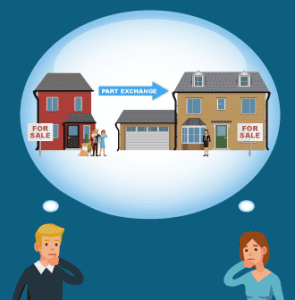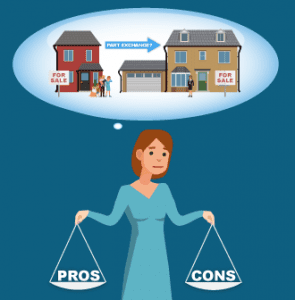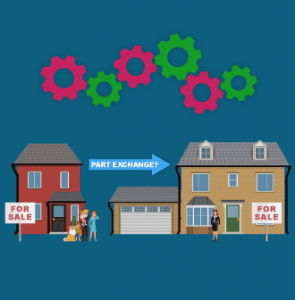What is Part Exchange on a House?
 Part-exchange is a trade of some or all of your property’s value to buy a new build home from a private developer.
Part-exchange is a trade of some or all of your property’s value to buy a new build home from a private developer.
A private builder will buy your home. You then use the equity from the sale towards the purchase of a unit in their development.
The difference from a normal sale of your house is that you won’t have to wait for completion before you move into the new build property.
The developer will effectively fund the purchase on the basis that they will sell your current property and get their money back.
You’ll also pay no estate agency fees and avoid all the hassles that come with selling your house on the open market.
It also works for those that are struggling to sell through an estate agent and have found the new build property of their dreams.
As a result, part exchange has become an increasingly popular offering as a means of presenting alternative solutions for homebuyers.
Part Exchange House Schemes Near You
Your ability to part exchange will often depend on your location in the country.
First off, you’ll need to check whether the developers are actually operating such schemes in your area. Some are quite selective about what they will and won’t accept.
Much will also depend on where the market is at and whether it makes sense for them to sell in the standard way. Generally speaking, if there’s a strong demand for their units part exchange is less likely.
Some of the part exchange developers we know of across the UK include Taylor Wimpey, Persimmon, Barratt Homes, Bellway, Redrow, Berkeley Homes amongst others. There are also a number of small and mid-sized homebuilders that operate locally that offer these schemes.
It’s quite rare for developers to advertise that they offer the ability to part exchange. We find it’s often mentioned when people express an interest in one of their homes but their own property hasn’t sold.
Either way, most will have local offices or showrooms where you can ask. The established firms also build relationships with estate agents in the area who can help make the right connections.
Part Exchange House Rules
There are a number of specific criteria that would be applied, including:
- An assessment of the true value of your house (i.e. based on Land Registry sold and not open market asking prices);
- The traded property is worth no more than approximately 70% of the sales price of the new build;
- Assurance that you have a sufficient amount of equity in the property;
- Making sure an offer of approximately 80-90% of the value of your home would be acceptable;
- The condition of your property is decent and mortgageable;
- Reassurance of your ability to ‘plug the gap’ if the new build property is worth more than the figure paid by the developer for your current home;
- You agree to have at least one independent valuation and survey (through the Royal Institute of Chartered Surveyors);
- Your property is within a location that fits within the developer’s own requirements;
- Your property is of standard construction;
- Your boiler, gas central heating and electrics / wiring are in good working order;
- If your property is a leasehold, anything under 85 years is unlikely to be accepted;
- You do not already have your house on the market. If it is, it will need to be removed;
- You will use your own conveyancer / conveyancing solicitor;
- You’ll agree to pay a reservation fee;
- Agreement for the developer to put a ‘for sale’ sign in front of the property and work with an estate agent to allow viewings and encourage a sale;
- The part-exchanged property will contain all the fixtures and fittings pre-agreed in a detailed schedule;
- In certain circumstances, your property is sold to a chain-free buyer (to shorten the sales timeline);
- The property will be left clean and tidy on the date of the part-exchange.
What Will the Developer Do After the Part-Exchange?
Once all is said and done, the developer will typically look to sell the property on the open market.
For them, the aim is to profit from the difference between the lower price paid for the property and the price they eventually sell it for.
But remember they will take on the estate agency fees and also the risk of selling on the open market.
They also profit by selling one of their own units to you.
Pros and Cons of a House Part Exchange
 In this short chapter, we’ll highlight some of the key ups and downsides of going ahead with a part-exchange of your home:
In this short chapter, we’ll highlight some of the key ups and downsides of going ahead with a part-exchange of your home:
Pros of a House Part Exchange
- You’ll eliminate estate agency fees (saving you between 1-3% of the sale price of your property);
- You’ll avoid the stresses and hassles of an open market sale such as viewing appointments, tyre-kickers, awkward negotiations and gazundering;
- It’s an option worth considering if you’re having difficulties in selling or you need to relocate fast;
- You can deal with the developer directly meaning there is a direct line of communication and nothing gets ‘lost in translation’;
- Once you have accepted an offer and there are no survey issues, the developer becomes a guaranteed cash buyer. In most cases, you won’t need to worry about your sale falling through or getting delayed;
- You’ll be getting a brand new property with a homebuilder’s warranty (remember to undertake a snagging survey before completing on the sale)
- If the new house is not ready yet, you can remain in your current home until it is. You’ll be safe in the knowledge that you’ll be able to move and won’t have to worry about selling;
- You can avoid the risks and complications that come with being in a house sale chain;
- As with any new build purchase, you won’t have to wait for the previous residents to move out of your new home.
Cons of a House Part Exchange
- Similar to buying a brand new car (which loses it’s value the moment it leaves the forecourt), freshly built properties come with a ‘new build premium’. This means that the value is often more than older properties in the same area;
- Although it’s completely unfair to tar all developers with the same brush, some have been knowing to be overly greedy with their part exchange offers;
- Although it is claimed that the sale process is much quicker, experience has shown us that this is often not the case;
- Related to above, the time it takes for a part-exchange to go through may not be worth the hassle of accepting 80-90% of the value. For example, you could use a quick (28-day) estate agency service like ours to achieve the full market value. You’ll still then be able to buy the property and, after estate agency fees, have some money leftover;
- The developer may claim to operate as a ‘cash buyer’ when part-exchanging, but this is rarely true. The process will take much longer compared to companies like Property Solvers;
- Due to the financial restrictions, it’s usually difficult to downsize when part-exchanging;
- With many new build homes being leasehold, escalating ground rents and unfair contract terms have put off more people from part-exchanging;
- New build developers will be reluctant to negotiate with you. This doesn’t mean that you can’t though!
- New build homes tend to have smaller rooms and lower ceiling heights compared to older properties (see some characteristics of homes over the ages here). Many are also squashed together and have poor parking facilities;
- A lot of people may be buying units in the development. This may affect the value you eventually get when it comes to resale. However, you should be ok if the plan is to keep the property for the medium term.
Why Not Just Use an Estate Agency (Instead of Part Exchange)?
 The traditional route of selling property using an estate agency works well for most people.
The traditional route of selling property using an estate agency works well for most people.
An open market sale is undoubtedly the best way to get the maximum value and the best exposure.
However, there are well-recognised risks involved in putting your home up for sale in this way:
- The process can take months (check out our local house market insights to see how long things are taking in your area);
- There’s no guarantee that the sale will go through even when an offer is made;
- The property market can be volatile (owed to the coronavirus or Brexit, for example). The perceived value may change from one week to the next if you are unable to sell the property quickly;
- If your estate agency is not promoting your property correctly, you may see no interest for a lengthy period of time and could feel forced to reduce your asking price;
- You might receive initial offers from prospective buyers only to see them drop out, or take an extremely long time to complete any required action;
- Related to the above, it may be that the buyers are waiting to sell their own property before they can buy yours which can cause huge delays;
- Estate agency fees can reach significant amounts, and the admin that goes into your listing and sale can be stressful and time-consuming.
It’s for these reasons (and more) why sellers make serious considerations about part exchange.
When executed well, part exchanging your property enables you to save time, hassle and complication.
There’s arguably more of a guarantee that you will be able to move forward with things and, quite possibly, save money.
How Does Part-Exchange of a House Work?
 The aim of a part-exchange is for a developer to purchase your house at the same time as you buy one on their books.
The aim of a part-exchange is for a developer to purchase your house at the same time as you buy one on their books.
Indeed, the process is fairly similar to a normal house sale but things are somewhat streamlined.
You won’t have to worry about putting your house up for sale as the developer will do that for you.
However, you’ll still have to instruct conveyancers and manage the move just like any house sale.
Below, we’ll go through the essential processes from start to finish.
Eligibility Assessment
The process usually starts with a ‘fact-find’ to establish whether you qualify for part exchange.
You may need to fill out an online form or one of the developer’s representatives will run through some questions with you.
These may include:
- Your estimation of the property value (this will typically be cross-referenced using Land Registry data). Usually, if the value of your home is anything more than 70% of the new home you intend to buy, part exchange cannot go ahead;
- Information on the condition of the house (including works you have undertaken, any extensions as well as the age of the gas central heating system and electrics);
- Previous sales history (when you bought the house and for what price);
- Information on mortgages and other secured loans against the property;
- How much equity you have in the property (i.e. the value of the property minus your home loans).
This is also your opportunity to read the small print and make sure you’re completely aware of how part-exchange works.
Home Visit
The developer’s agent will visit your property to confirm it’s structurally sound and check the overall condition.
The agent should be friendly and be able to explain the process in a straightforward manner.
Alternatively, they may send 2 or 3 local estate agents.
Note that this is not a formal valuation. The developer will essentially want to make sure that there will be no issues when selling.
Remember to do your research about the value of your property (feel free to request one of our bespoke house valuation reports).
Note that if the house you’re intending to part-exchange is worth more than 60-75% of the sales price of what you want to buy, you’ll probably be excluded.
The developer may also have a cap on the maximum value of the property they are willing to part exchange.
If you own a leasehold property and the lease is less than 80 years, you’re likely to also excluded unless you’re willing to pay for the extension yourself prior to completion.
Provisional Offer
You’ll then receive a verbal offer subject to a professional survey.
The developer will want to secure a sale on your house within 8-10 weeks of it going on the market.
Although you may be told that the valuation is final, we see no reason why you shouldn’t question things.
There will be no obligation for you to accept.
However, the developer may reserve the right to revise the offer if you leave it for too long.
Initial Legal / Credit Checks
Once the developer has all the information, they will undertake a credit check to ensure that you’re in a strong enough financial position.
Their legal department will also check the ownership status plus the existing mortgages and secured debts (if any).
Note that if there is insufficient equity, you may need to demonstrate how you will ‘fill the gap’.
Choose Your Home
You can then select which property you wish to part-exchange.
Much will depend on what the developer has available and what phase the project is in.
In the same vein, not all the properties available will be eligible for a part exchange purchase.
Before the process commences, it’s best to discuss your options with the company to make sure that you’ll be able to purchase your favourite property in this way.
Remember to check all the details with a fine-tooth comb to make sure you’re getting good value for money.
Checking how many square foot the property has alongside the size of the garden and positioning within the development.
You should also look into organising your own mortgage.
Reservation Fee
Once you have selected the property you wish to go for, the developer may request a sum of money to ‘hold’ the property.
This varies from developer-to-developer, but some may request that you pay a fee to secure the property you wish.
Always make sure that this fee is 100% refundable should things fall through. You may even try and negotiate not having to pay it at all.
The reservation fee will be taken off the final purchase price.
Independent Property Valuation
The developer will determine the value of your house based on a professional valuation conducted by a Royal Institute of Chartered Surveyors (RICS) professional. They will pay the cost of this.
If your property needs major works or has structural defects, the developer may not accept it without more of a discount.
Always make sure you see a copy of the report.
The developer will also often ask for up-to-date gas and electrical safety certificates. You will need to cover the cost of these.
Valuation of the New Build Property
You are also welcome to instruct your own RICS valuation of the new build property you will be part-exchanging.
This will ensure that the developer is not over-valuing the property and ‘pulling the wool over your eyes’.
Remember to ask the valuer to account for the ‘new build premium’. New build properties often look very different to how they appear on the developer’s website and glossy brochures.
Indeed, there’s also nothing stopping you from trying to negotiate the price you’re about to pay.
For example, if you’re seeing that a number of units are unsold or the market is going through a downturn go ahead and haggle!
Offer is Made
Although you’ll save on estate agency fees, the offer you’re likely to get is around 80-90% of the valuation.
You’ll be able to complete a sale without waiting for a buyer to make their move.
There will be no third party dragging their feet or threatening to drop out – so it will be possible to move into your new home quickly.
This also means that you won’t be subject to any slow-moving property chains. You can simply get on with the sale and the subsequent purchase and moving process.
Remember you will also have to pay conveyancing fees and stamp duty.
There should be no pressure for you to accept the offer. The developer should also provide a sufficient amount of time for you to consider the proposal.
Do not be afraid to negotiate, look for a ‘win-win’ transaction and read through the small print.
Negotiation
Although the developer may say that there is no scope to negotiate, under consumer law you are well within your rights to do so.
In a down market, or if the developer is finding it tough to shift units, extra incentives may be offered.
We’ve seen developers pay for moving or legal costs, white goods and even offering smart cars!
If you see this happening, we suggest pushing hard for a lower price.
Final Financial Assessment
The developer will want to make sure that you will have the means to cover any surplus monies owed.
For example, say your property is worth £150,000 and the new build you’re part-exchanging is worth £200,000.
The developer would offer you £127,500 (85% of the value). You would then need to find £72,500.
Here, much would depend on how much equity you have in your current home, if you have any savings and what kind of mortgage you could access (based on the £200,000 value).
Needless to say, this can be quite a technical process. Most developers have their own finance departments who can assist you.
We would also suggest seeking independent financial advice.
Organise Mortgage
The developer will usually require you to have a mortgage application in principle (AIP) in place before proceeding.
This can be organised with a good mortgage broker or directly with your lender. We usually recommend the former as you will be able to access the best products in line with your financial circumstances.
The developer will not be able to advise you on the best mortgage options.
Conveyancing
The conveyancing process is fairly similar to a normal house sale.
Your solicitor may suggest extra searches related to the surrounding land.
The time to sort the legals out is likely to take between 6-8 weeks, depending on efficient the conveyancer you’re dealing with.
Note that, bar exceptional circumstances, the developer will not pay your conveyancing fees.
Exchange and Completion
Again, the final stages of the sale follow the normal conveyancing process.
You will usually have to pay a 10% deposit (like with any other home sale).
Some developers may stipulate a ‘delayed completion’ due the property not being ready yet.
In most cases, you will have to pay a deposit towards the new home.
However, due to the fact that you will be waiting for them to finish the build, some developers may be willing to waive this (and you pay the full amount upon completion).
Property Handover After Part Exchange
Prior to completion, you must leave all the agreed fixtures and fittings.
These are usually highlighted in the Law Society’s Property Information Form (TA6).
As well as leaving the house clean and tidy, there may also be a legal agreement to carry out repairs and/or reinstatement of walls, ceilings and floors.
This is usually relatively small jobs like filling holes, a fresh lick of paint and making sure the garden has been well kept.
The developer may have a retainer which will be released once they’re satisfied with how the house is left.
Marketing Your Property
There are some developers that may suggest having a legal restriction and some kind of option agreement.
Most will require the ability to market the property before you move out. This means that you will need to give them reasonable access and a ‘for sale’ sign will appear at the front of your house.
There are some developers that will offer cashback should the property fetch more than the pre-agreed valuation.
Say, for example, the original RICS valuation was £100,000 and the developer manages to sell for £105,000, you may be able to receive the £5,000 back.
It’s well worth checking this during the negotiation phase.
Buying a Part Exchange House from a Developer
It’s worth noting that not every property is suitable for part exchange.
Whether or not you will be able to enter into a transaction of this kind will be determined by the developer. But, remember, that the ultimate decision remains with you.
We’d also suggest doing the following:
Seek independent legal advice
Although most of the conveyancing process involved with a part exchange is similar to a ‘normal’ house sale, there may be some extra contractual obligations for you to be aware of.
For example, the developer may apply certain conditions regarding the value and the condition of the property after the part exchange.
We’ve also heard of developers trying to claim back funds after the part-exchange if they struggle to sell the house.
As mentioned already in this post, if you’re buying a leasehold property, check the ground rent and the specifics of the lease itself.
A good conveyancing solicitor will be able to read through the contracts to make sure there’s nothing untoward.
They will also undertake further conveyancing searches which will also flag up anything unusual.
Check the costs involved in the part exchange scheme
One of the benefits of part-exchanging is that you won’t have to pay estate agency fees.
You will still have to pay conveyancing fees, stamp duty, mortgage arrangement /broker fees and house sale / moving costs.
Although we hope it doesn’t get to that stage, it’s still worth confirming what the fees would be if you decide to withdraw from the sale.
Check the developer’s credentials
Make sure they adhere to the Consumer Code for New Homes.
Crucially, the developer should be registered with at least one of the following home warranty bodies:
- National House Building Council (NHBC);
- Premier Guarantee;
- Local Authority Building Control (LABC);
- Checkmate.
All of them set out detailed technical standards that homebuilders must adhere to.
Failure to comply with these standards provides you with the right to compensation. You’ll also have a place to go to if there’s anything you’re not happy with.
Also, remember head to your local council‘s planning portal where you can see data on how the development was publically received and approved.


